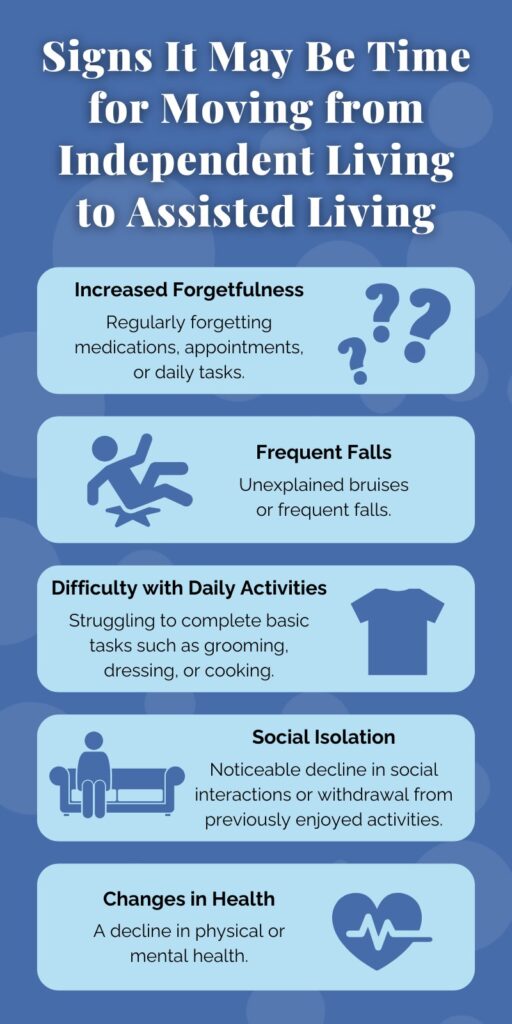Two of the main senior living categories are independent and assisted living. When an older adult’s caregiving needs evolve to require the latter, the shift can be gradual or immediate. For example, they might:
- Initially have minimal help and slowly need more.
- Be diagnosed with a new medical condition that requires added support.
At The Ridglea Senior Living, we often counsel families wondering if their loved ones would benefit from assisted living in the Dallas-Fort Worth area (DFW). How can you determine if they need to move? If they do, how can you convince them it’s the best choice for their health and well-being?
Understanding the differences between these settings can illuminate this path for you and your loved one. Let’s start by explaining what each option offers, and then we’ll share the signs to be on the lookout for.

Independent Living and Assisted Living
Independent living communities in Dallas-Fort Worth are designed for seniors who can care for themselves but want the convenience of a hassle-free lifestyle and a social environment. These communities offer housekeeping, meal services, and recreational activities; residents enjoy a sense of freedom and autonomy while having the option to socialize with peers. This can be a match for capable seniors who seek companionship and worry-free lifestyles.
DFW assisted living communities, on the other hand, cater to individuals needing more assistance with daily activities like bathing, dressing, medication management, and mobility. These communities provide 24/7 team member support and health monitoring, so residents receive the personal care they require.
Both environments blend privacy and community, where residents live independently within their apartments but still receive support as needed. Housekeeping, meals, maintenance, and programming are provided. There can be other amenities as well, like fitness centers and movie theaters, depending on the community.
The key difference is that assisted living has a higher care level.
Signs It May Be Time for Moving from Independent Living to Assisted Living
Get ready for a hard truth: It’s common for seniors and their families to be in denial about the need for assisted living. Seniors value their independence, and as adult children, we don’t want to make them unhappy or worried. Yet living without necessary support can lead to poor health outcomes, including accidents.
Even if they are not needing to make this change, it makes good sense to be aware of certain indicators that show the need for more support:
- Increased Forgetfulness: Regularly forgetting medications, appointments, or daily tasks like brushing teeth.
- Frequent Falls: Unexplained bruises or frequent falls may indicate declining mobility or balance issues that raise safety concerns.
- Difficulty with Daily Activities: Struggling to complete basic tasks such as grooming, dressing, or cooking.
- Social Isolation: A noticeable decline in social interactions or withdrawal from previously enjoyed activities may indicate a need for a more engaging community.
- Changes in Health: A decline in physical or mental health, such as new diagnoses or worsening conditions, can create a need for higher-level care.
Emotional well-being should be noted as well; increased anxiety or depression can warrant a conversation about more supportive living arrangements. If their independent living community cannot address these concerns, it’s time to have some important conversations.

Starting the Conversation About Assisted Living in DFW
Seniors react differently to these conversations, so we recommend a compassionate, step-by-step approach. Start by discussing your observations and encouraging your loved one to express their feelings about their current living situation. It can also be helpful to make a list of pros and cons regarding each option.
Another approach is to involve their physician, as healthcare professionals can provide insights into your loved one’s health and overall well-being. Why not ask them to accompany you on visits to communities for assisted living in the Dallas-Fort Worth area? That might spark interest and reshape their view of the new lifestyle—they can see the benefits for themself.
The Ridglea Senior Living: Assisted Living in DFW
The Ridglea is a boutique senior living community in Fort Worth, TX, and we often host tours. In addition to assisted living support, The Cottage is our protected setting designed for residents with Alzheimer’s and other forms of dementia. Our specialized caregivers focus on letting residents live in the moment and helping them feel celebrated.
We prioritize comfort and care with a supportive environment tailored to the needs of each resident; our caregivers strike the balance between promoting independence and ensuring help is readily available when needed.
When considering a shift from independent to assisted living, it may be beneficial to think about future needs. Preparing for the changing landscape of senior care can make all the difference. It’s wise to recognize that this transition may not only improve physical safety but can also offer a supportive community that uplifts your loved one during this new chapter.
The Ridglea Senior Living: Luxury Assisted Living in DFW
The Ridglea inspires a sense of family and compassion that echoes its mission: Passion Is Our Purpose. Experience a supportive community where each resident is valued, with care options tailored just for them. Contact our team to arrange a tour and see how our vibrant community could be the welcoming home your family member needs.



